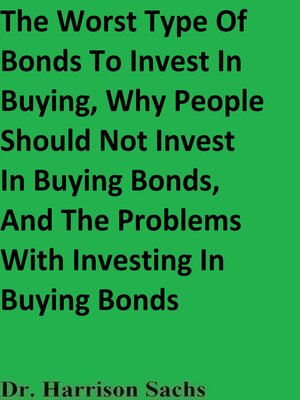The Worst Type of Bonds to Invest In Buying, Why People Should Not Invest In Buying Bonds, and the Problems With Investing In Buying Bonds
ebook
By Dr. Harrison Sachs

Sign up to save your library
With an OverDrive account, you can save your favorite libraries for at-a-glance information about availability. Find out more about OverDrive accounts.
Find this title in Libby, the library reading app by OverDrive.



Search for a digital library with this title
Title found at these libraries:
| Library Name | Distance |
|---|---|
| Loading... |
This essay sheds light on the worst type of bonds to invest in buying, explicates why people should not invest in buying bonds, and demystifies the problems of investing in buying bonds. When cherry-picking a bond to invest in buying, it can be eminently overwhelming to ascertain which particular bond is apt to yield the highest return on investment overtime from its principal payment and recurring coupon payments. There are a copious amount of disparate types of bond to choose from when investing in buying bonds which can render the prospect of becoming a bond investor all the more overwhelming for the novice bond investor. Some of the various types of bonds encompass corporate bonds, junk bonds, municipal bonds, treasury bonds, adjustment bonds, agency bonds, foreign bonds, convertible bonds, and non-conventional bonds. Out of all the disparate of bonds to invest in buying, the utmost worst type of bonds to invest in buying are junk bonds. An investor should desist from buying junk bonds. Investing in buying junk bonds is an act of ineffable imprudence since junk bonds yield a steep default risk. It is unwise to purchase bonds purely based on speculation. Junk bonds are ranked anywhere from the BB+ tier to the D tier. Even though bondholders will take priority to be paid what they are owed by the company before the preferred shareholders and common shareholders of the company are paid what they are owed by the company in the event of a company liquidation, there is however no guarantee that bondholders will be repaid any of the principal amount of their bond investments post a company undergoing the liquidation process. Companies that issue junk bonds are at a higher risk of becoming defunct than companies that issue AAA-rated long-term corporate bonds. This is because companies that issue junk bonds are at a higher risk of being unable to meet their financial obligations than companies that issue AAA-rated long-term corporate bonds. Companies that issue junk bonds often lack a long proven track record of profitability and often have a low credit rating. While investing in buying junk bonds may seem eminently enticing to the novice bond investor due to junk bonds offering a higher coupon rate than investment-grade corporate bonds, the default risk of junk bonds are high which ultimately renders junk bonds the utmost worst type of bonds to invest in buying if an investor is keen on maximize his probability to reap a positive return on investment from his bond investment. The risk of succumbing to a capital loss from investing in buying junk bonds are relatively lofty when you take into account that there is a high likelihood that the issuer of the junk bonds "will file for bankruptcy and that you will never get your money back". Buying junk bonds maximizes your investment risk relative to buying AAA-rated long-term corporate bonds which contrastingly minimize your investment risk as bonds that offer a coupon rate that is higher than the coupon rate of treasury bonds. The overarching goal of investing in bonds is to be able to reap a positive return on investment. While investing in buying junk bonds can allow you to a positive return on investment if the junk bonds do not go into default, the probability of succumbing to a negative return on investment are high and therefore should deter investors from taking heed of investing in buying junk bonds. Bond investors should aim to minimize their probability of succumbing to capital losses from their bond investments. Junk bonds are imprudently purchased by investor based on their overly bullish speculation that the issuer of the junk bonds will be able to meet its financial obligations to its bondholders. "Junk bonds have a...







